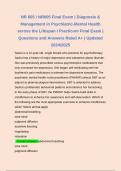NR 605 / NR605 Final Exam | Diagnosis &
Management in Psychiatric-Mental Health
across the Lifespan I Practicum Final Exam |
Questions and Answers Rated A+ | Updated
2024/2025
Sasha is a 22-year-old, single female who presents for psychotherapy.
Sasha has a history of major depression and substance abuse disorder.
She was previously prescribed various psychotropics medications that
only increased her depression. She began self-medicating with her
boyfriend's pain medications to tolerate her depressive symptoms. The
psychiatric mental health nurse practitioner (PMHNP) selects DBT as an
adjunct to pharmacological interventions. DBT is selected to address
Sasha's problematic behavioral patterns and enhance her functioning.
In the early phase of DBT, the PMHNP helps Sasha build skills in
mindfulness to enhance her awareness and self-observation. Which of
the following are the most appropriate exercises to enhance mindfulness
skills? Select all that apply.
abdominal breathing
wise mind
judgment diffusion
assertive listening
negotiating
relaxation
- Correct Answer -abdominal breathing
wise mind
judgment diffusion
,Rationale: Mindful abdominal breathing, wise mind, and judgment
diffusion are common mindfulness exercises. Assertive listening and
negotiating are exercises to build interpersonal effectiveness and
relaxation exercises are used to build distress tolerance skills.
Sasha also has low distress tolerance. The PMHNP helps her build
distress tolerance skills as a healthier alternative than self-medicating
with her boyfriend's pain medications.
Which of the following are the most appropriate exercises to enhance
distress tolerance? Select all that apply.
reducing vulnerabilities
relaxation
recognizing emotions
making a request
self-soothing
radical acceptance
- Correct Answer -relaxation
self-soothing
radical acceptance
Rationale: Radical acceptance, relaxation, and self-soothing exercises
build skills in distress tolerance. Recognizing emotions and reducing
vulnerabilities exercises build skills in emotional regulation. Making a
request is an exercise to build interpersonal effectiveness.
In the next phase of DBT, Sasha reports that she wants to be able to feel
again since her emotions have been "numbed out" due to her substance
abuse. The PMHNP uses skills in emotional regulation to help Sasha
learn to control her feelings rather than being controlled by them.
,Which of the following are the most appropriate exercises to enhance
emotional regulation? Select all that apply.
problem-solving
realistic goal setting
passive versus aggressive behavior
radical acceptance
opposite action to emotion
- Correct Answer -opposite action to emotion
problem-solving
Rationale: Opposite action to emotion and problem-solving exercises
build skills in emotional regulation. Realistic goal setting is an exercise to
enhance self-management. Radical acceptance builds skills in distress
tolerance, whereas exercises in passive versus aggressive behavior
build skills in interpersonal effectiveness.
Anquiette smokes, drinks, and bites her nails nonstop.
match the psychosexual stage with the corresponding fixated behaviors:
-Stage I: 0-1 year, oral, mouth
-Stage II: 1-3 years old, anal, bowel, and bladder
-Stage III: 3-6 years old, phallic, genitalia
-Stage IV: 6-12 years old, latency, dormant sexual feelings
-Stage V: Puberty to death, genital, mature sexual feelings
- Correct Answer --Stage I: 0-1 year, oral, mouth
Rationale: Oral desire is the pleasure center for the infant. When oral
needs are unmet, libidinal energy fixates, resulting in latent aggressive
or passive tendencies, such as smoking, nail-biting, thumb-sucking,
excessive drinking.
, Quinn is very possessive of his mother and stomped out of the room
when his father hugged and kissed her.
match the psychosexual stage with the corresponding fixated behaviors:
-Stage I: 0-1 year, oral, mouth
-Stage II: 1-3 years old, anal, bowel, and bladder
-Stage III: 3-6 years old, phallic, genitalia
-Stage IV: 6-12 years old, latency, dormant sexual feelings
-Stage V: Puberty to death, genital, mature sexual feelings
- Correct Answer -Stage III: 3-6 years old, phallic, genitalia
Rationale: The pleasure center for the phallic stage is the genitalia.
Young children become aware of their genitalia and distinguish the
differences between boys and girls. When conflict arises in this stage,
fixation with the opposite sex parent occurs, called the Oedipus complex
for boys and the Electra complex for girls. Failure to resolve the complex
may result in adulthood vanity and ambition.
Nikita is only interested in playing basketball and University activities and
has difficulty creating relationships.
match the psychosexual stage with the corresponding fixated behaviors:
-Stage I: 0-1 year, oral, mouth
-Stage II: 1-3 years old, anal, bowel, and bladder
-Stage III: 3-6 years old, phallic, genitalia
-Stage IV: 6-12 years old, latency, dormant sexual feelings
-Stage V: Puberty to death, genital, mature sexual feelings
- Correct Answer -Stage IV: 6-12 years old, latency, dormant sexual
feelings
Rationale: During the latent stage, the libido is repressed or sublimated;
there is no corresponding erogenous zone. The child begins to act on
impulses indirectly by focusing on school, sports, and building




